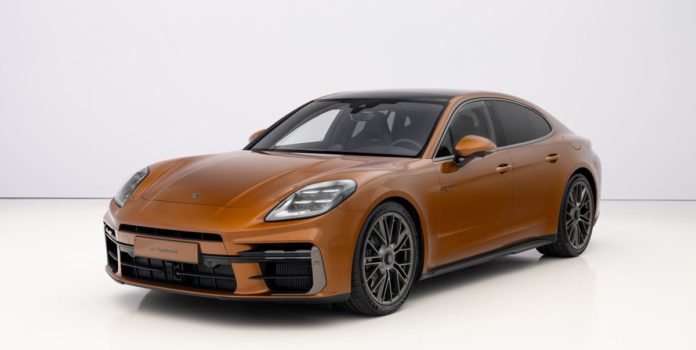- The 2024 Porsche Panamera debuts with more power, revised styling, an updated cabin, and improved entertainment and safety technology.
- Entry-level Panameras feature a 348-hp turbocharged V-6, while the 670-hp Turbo E-Hybrid sports a twin-turbo V-8, a more powerful electric motor, and a larger battery pack.
- Optional on the Turbo E-Hybrid is an active suspension that can lean into corners and raise the body for easier entry and exit.
Following a string of increasingly revealing teases, Porsche finally has taken the wraps off the first models of the redesigned 2024 Panamera lineup, the standard Panamera sedan and all-wheel-drive Panamera 4, plus the range-topping (for now) Turbo E-Hybrid. While the Sport Turismo wagon body style has been dropped for this third generation due to slow sales, there’s still plenty to get excited about.
Refined Inside and Out
As we learned during recent protoype drives, the new Panamera brings more of everything: more technology, more hybrid capability, more luxury, and more performance. Stylistically, it evolves from the second-gen model’s form, gaining cleaner lines and more muscular front fenders that rise above the hood like those on a 911. Larger air intakes grace a chunkier snout, while a full-width light bar accentuates a revised rear end.
New wheel designs, including the first-ever fitment of central-locking wheels on a four-door Porsche, also are available. And in a sign of things to come to Porsche’s future capital-T Turbo models, the Panamera Turbo E-Hybrid’s interior and exterior trim are dressed in a new dark-hued Turbonite finish.
Porsche already gave us a deeper look at the new Panamera’s cabin, which borrows from the Taycan EV’s innards. But the highlights include a gear selector toggle now positioned on the dash as well as an array of up to three digital displays: a 12.6-inch unit for the instrument cluster and dual 10.9-inch center and passenger-side touchscreens, the latter being optional.
Porsche says new foam padding improves the comfort of the Panamera’s seats, which can be upholstered in materials other than leather. Controls for the drive modes and instrument cluster now reside on the steering wheel, and an updated infotainment system brings better functionality of a user’s MyPorsche app when connected to Android Auto or Apple CarPlay.
The Panamera’s adaptive cruise control and other driver-assistance systems also have been updated, and the car can now be remotely parked in certain situations via the driver’s smartphone.
Smarter Powertrains
The Panamera’s powertrains closely hew to those found in the updated Cayenne SUV. Propelling the standard rear- and all-wheel-drive models is a revised turbocharged 2.9-liter V-6 that develops 348 horsepower and 368 pound-feet of torque, increases of 23 horses and 37 pound-feet over the outgoing version. An eight-speed PDK dual-clutch automatic remains the only transmission choice, with Porsche claiming a 60-mph time of 5.0 seconds for the base car and 4.7 seconds for the Panamera 4. Those are surely conservative estimates, though, as we recorded a 4.4-second run in a test of a 2021 Panamera sedan.
The headliner is the all-wheel-drive Turbo E-Hybrid, the first of four Panamera E-Hybrid models that will eventually be offered. While Porsche has yet to release full specifications, the new setup centers around a revamped twin-turbo 4.0-liter V-8, which moves from twin- to single-scroll turbos, and a revised eight-speed PDK dual-clutch gearbox that now integrates a more powerful 187-hp electric motor. Combined output is a heady 670 horsepower and 685 pound-feet of torque; expect a future Turbo S variant to approach the combined 729 horses found in the latest Cayenne Turbo E-Hybrid.
Other elements of the E-Hybrid’s 370-volt electrical system include a 21.8-kWh battery pack, which Porsche says can be replenished in a little over two hours via a stronger 11.0-kWh onboard charger. We estimate an EPA-rated electric range of close to 30 miles, and Porsche claims a (also surely conservative) 60-mph time of 3.0 seconds plus a top speed of 195 mph.
Advanced Suspension
All third-gen Panameras ride on new two-chamber air springs and adaptive dampers as standard and can be outfitted with rear-axle steering for greater stability and maneuverability. Yet E-Hybrid models go a step further in adopting Porsche’s new optional Active Ride system, which combines single-chamber air springs and hydraulically linked cylinders at each wheel to do away with anti-roll bars altogether.
Our brief drives of prototypes in Germany revealed the Active Ride system to be central to the new Panamera’s increased bandwidth of character, bringing both greater body control in the car’s sportier drive modes and improved comfort in its calmer settings. In the default Hybrid mode, the system can be configured to gently lean into corners like a motorcycle as well as tilt the body fore and aft to counter acceleration and braking forces. Active Ride also can dynamically raise and lower the body by 1.2 inches to maintain overall ground clearance. Open the doors and the system can automatically raise the car 2.2 inches to ease ingress and egress, dropping it back down once the doors close.
Pricing for the new Panamera starts at $101,550 for the base car and $108,550 for the Panamera 4, with order books open now for spring deliveries. The Turbo E-Hybrid should follow soon after and will likely eclipse the $197,850 ask of the outgoing Turbo S E-hybrid sedan, but Porsche promises additional details closer to its on-sale date.
Technical Editor
Mike Sutton is an editor, writer, test driver, and general car nerd who has contributed to Car and Driver‘s reverent and irreverent passion for the automobile since 2008. A native Michigander from suburban Detroit, he enjoys the outdoors and complaining about the weather, has an affection for off-road vehicles, and believes in federal protection for naturally aspirated engines.

